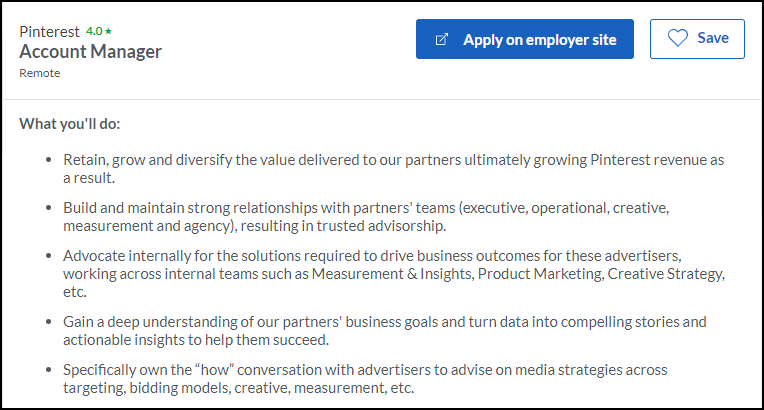Account managers play a pivotal role in mature sales organizations by looking after existing clients, nurturing these relationships and exploring additional ways to grow revenue.
In this article, we’ll look at exactly what the account manager role involves, what it takes to be a successful account manager and how hiring managers can find the right person for the job.
What is an account manager?
The account manager is the primary point of contact between your company and its most important customers. The primary goal is to build strong relationships with those accounts, boosting retention and increasing revenue.
To achieve this objective, account managers must regularly communicate with customers to ensure they’re fully aware of their needs, then collaborate with internal teams to meet those necessities.
While it might sound like a similar role, the account management definition differs from that of account executives (AEs). An AE covers a wider range of the sales process, including acquiring new clients and closing deals. In contrast, account management is a post-sales role, focusing on existing client relationships.
The customer success manager (CSM) role is similar to the role of an account manager, meaning that both holds some responsibility for customer relationships and satisfaction.
However, the CSM role differs in that it focuses on ensuring clients achieve their desired outcomes, overseeing important tasks like onboarding and ongoing support.
When it comes to account managers, definitions of the role identify them as being revenue-oriented, looking for opportunities to create win-win situations for both the customer and the company.
What does an account manager do?
While the exact duties vary depending on the organization, account manager responsibilities usually include the following:
Managing customer relationships. As the main liaison between the company and its customers, account managers need to foster open communication, address any concerns and ensure the team meets any needs in a timely and efficient manner.
Driving revenue growth and retention. Account managers ensure their customers are getting the maximum value out of the product, so when it’s time to renew there’s no hesitation. By identifying mutually beneficial possibilities that align company solutions with customer needs, account managers can also find fresh cross-sell and upsell opportunities within the account.
Resolving client issues and concerns.When issues inevitably come up during the course of the relationship, account managers need to resolve them speedily and effectively. By collaborating with internal teams, such as product development and customer support, account managers ensure their clients receive the best possible service and present their feedback when making company decisions.
Developing account strategies. To achieve all of the above, account managers need to create tailored account management plans that include goals, strategies and tactics for each client. A fundamental responsibility of account managers is remaining proactive, for the benefit of their team and their clients.
Monitoring account performance. Tracking relevant sales metrics and analyzing key performance indicators (KPIs) enables account managers to measure the success of their account plans and identify areas for improvement. Regular meetings with key players on both sides of the customer relationship ensure the account plans are appropriate and produce the desired results.
Gathering customer feedback and insights. Account managers gather additional customer feedback and provide insights into client preferences, pain points and potential opportunities. This information is then used to inform product development, marketing strategies and customer support.
This account manager job description from Pinterest shows some of the specific responsibilities employers expect.

Account managers can expect their daily to-do list to include talking with customers, coordinating internal teams, reviewing account performance and coming up with fresh strategies to meet company and customer objectives.
Account manager performance is often measured through a combination of customer satisfaction and revenue-based metrics, such as:
Renewal rate
Retention rate
Churn rate
Customer lifetime value
Customer satisfaction
Net promoter score
Upsell rate
Cross-sell rate
Revenue growth
Account manager salary and benefits
Like most sales roles, account managers are typically compensated through a combination of base salaries and performance-based incentives, such as bonuses and commissions paid on renewals or other sales within the account.
Sales managers can calculate commissions as a percentage of the revenue generated from accounts or award a flat fee for achieving specific targets.
According to Glassdoor, the average base pay for an account manager job in the United States in 2023 is $52,611. When you add the estimated additional pay of $20,733, that brings the total average pay up to $73,344.
This is just an average, though, and account managers with the right combination of experience and skills can expect to earn a lot more.
For example, the estimated average total pay for an account manager at Brocade in 2020 was $290,217 (made up of $127,833 base salary and $162,384 in additional pay), ranging up to a maximum of $500,000.
For comparison, Glassdoor also reports that the average total salary for a sales rep is currently $85,481 (made up of a $56,802 base salary with $28,680 in bonuses and commission).
Account managers can also receive a range of benefits and perks as part of their compensation package, including:
Health insurance
Retirement plans
Paid time off
Professional development opportunities
Flexible working hours
Remote work options
The account manager career path
If you’re looking to get started as an account manager, it helps to have already held a sales-related role.
While some job openings might allow you to go directly into account management, most hiring managers expect candidates to already have experience in the industry, as you can see here:

As a result, most account managers begin their career path in entry-level sales, marketing or customer support positions.
Account managers will also typically hold a bachelor’s degree in business, marketing, communications or a similar field.
Once you’ve landed an account manager position, you’ll find it opens up additional opportunities for growth and advancement within the sales and customer relationship management fields.
For example, you could grow your skills by managing customer accounts in a specific industry, such as healthcare or manufacturing, making yourself more valuable to the business.
A successful account manager may soon be promoted to senior account manager or account director, overseeing larger or more complex accounts or leading account management teams.
Alternatively, you can use the experience you’ve gained in account management to reach out for broader strategic roles within the organization, such as sales director or VP of sales.
What makes a great account manager?
Candidates who thrive in the account manager position require a very specific set of strengths, balancing an aptitude for sales with building long-term relationships.
In particular, hiring managers look for the following key skills and attributes.
Communication
Account managers need to be masters of communication, using different channels to talk with their customers and then actively listening to get a deeper understanding of their needs and challenges.
According to Dan Englander, CEO of Sales Schema, key account managers should use sales methodologies like the Sandler approach to ensure they understand the customer’s pain, budget, decision-making process and timeframe.
Planning
Planning for the future will benefit your management abilities and team’s output. It will also be a major advantage for your colleagues and clients as they focus on reaching set goals.
Use existing customer data to strategize your current approach and plan for the future. Consider conducting a white space analysis: a process designed to identify any gaps or unexplored areas within a specific market. Analyze account data from your customer relationship management (CRM) software and talk to your customers.
Utilize the information to address client concerns (e.g., What needs aren’t currently being met?) For example, have there been any changes in the customer lifecycle that would change their requirements? Do you offer any other products or services that could deliver more value to the customer? Are there other teams within the account that might benefit from your solution?
Collaboration
Being an account manager doesn’t mean trying to solve all of the customer’s problems by yourself. You have to work with internal teams to develop solutions and ensure the customer receives exceptional service.
Take the time to get to know other departments and their capabilities to get the most out of your collaboration. Rather than just relaying your account requirements, work together to develop an actionable plan that satisfies the customer without placing unnecessary pressure on your colleagues.
Time management and organization
It’s easy to get overwhelmed when handling multiple accounts while juggling different responsibilities, deadlines and requirements. Account managers need to prioritize and keep track of their task list, ensuring they’re spending enough time on the truly important work and aren’t simply reacting to whoever shouts the loudest.
Decide in advance how you’ll spend your day. While it’s important to be responsive to your clients’ needs, it’s difficult to get anything done if you’re constantly checking your emails or jumping on calls. With the right project management skills and time-saving tactics, you can give each of your customer accounts the attention they need.
Tech savviness
Rather than trying to coordinate multiple account plans in their head, account managers use different tools to stay on top of each client. Start by looking at your main responsibilities and then explore the relevant solutions available.
For example, a CRM system enables account managers to track all of their customer data and nurture their account relationships. Task management software makes it easier to keep on top of your to-do list and ensure you’re doing the work that truly matters. Knowing how to use the right account management software makes the whole process much easier.

Sales and negotiation
Account managers also need to look after their own business’s objectives too. Whether it’s contract renewals, cross-selling different products or upselling to a more powerful solution, account managers have to be capable of closing the deal, negotiating favorable terms and generating more revenue.
While there are many different sales methodologies you can use, account managers should be experts at value selling. By highlighting your solution’s financial value to your accounts, they’ll be far more likely to focus on the benefits instead of the costs.
Curiosity
The best account managers have an insatiable curiosity for what’s going on in their accounts. By following industry news, understanding the organizational setup and keeping track of any business developments, you’ll be in an ideal position to identify any upcoming opportunities and challenges (sometimes even before the client does).
Account managers should also be curious about their business and the solutions it offers. By getting a deep understanding of your products and services, you’ll be able to make genuinely helpful recommendations to your accounts.
Data analytics
You don’t need to be a data scientist to be an account manager, but knowing how to analyze metrics and other sources of sales data will help you make smarter decisions for both your business and your accounts.
For example, historical client data can tell you which accounts are most likely to churn, which enables you to take action. Similarly, showing customers exactly how much money they’ve saved by using your solution will make contract renewal an obvious decision.
Proactive thinking
Account managers need to respond quickly to customer requests, acknowledging and responding to any calls or emails as soon as possible during work hours. However, great account managers take this a step further and are proactive, using their knowledge of the customer to anticipate any potential issues and resolve them before they become a problem.
Proactive account management ties in closely with curiosity. Use what you’ve learned about your client, their business and the industry at large to approach the account and give them practical advice on gaining more value from your product and improving their results.
Hiring the right account manager for your business
As the primary point of contact for your business, you need to find an account manager who possesses the right skills and experience for your organization.
Before you start the search for your dream candidate, look within your sales organization. Is there anyone on the sales or customer support team you could promote to account manager?
Existing employees already have first-hand knowledge of both your customers and your solution, giving them a strong advantage.
Hiring an account manager externally
If none of your current team members would be suitable for the role, it’s time to look outside the company. Start by asking trusted colleagues, clients and others in your network if they know of anyone who would be a good fit for the position and the company.
One of the most popular ways of finding candidates is through job boards, such as Glassdoor, Monster and Indeed. More sales-focused job portals, such as SalesHeads.com and SalesJobs.com are another way to attract a wide range of qualified candidates.

If you have a particularly strong social media following, consider posting your job openings on LinkedIn, Facebook and Twitter.
You’ll reach people who are already interested in your brand, while colleagues and contacts can easily share the message with their followers too.
If you’re still struggling to find the right candidate for the job, consider using a recruitment agency specializing in sales roles. Although it will cost more to use a recruiter, their expertise and resources can source candidates with the proper experience and qualifications you need.
As you review potential candidates, look for relevant experience and skills. Have they worked in customer-facing roles before? Can they demonstrate the ability to communicate effectively and work as part of a team?
Look for examples of past accomplishments in managing client relationships, achieving revenue targets and resolving customer issues.
Different types of account managers
Although the role of an account manager can cover a lot of responsibilities, many will have different experiences and skill sets. It’s important to make sure you look for the right person and you can narrow down your search with additional qualifiers in the job title.
Here are a few different types of account manager role and what they could do for your business:
Sales account manager
Most account managers could be described as sales account managers. A sales account manager is primarily responsible for managing sales accounts, managing customer accounts once the sale has been made and encouraging clients to make repeated purchases.
Technical account manager
Is your product or solution is more complex or requires specialized knowledge to operate to its full potential, you should consider hiring a technical account manager. Technical account managers usually train customers how to use products to their full potential. They also coordinate with the sales and customer success teams to ensure internal teams understand the product and can support the customers when needed.
Strategic account manager
Strategic account managers, as the name suggests, take a more strategic approach to account management. They are given a wider scope in order to identify which clients – and which kinds of clients – generate their business the most revenue.
Account manager job posting template
To get started, use the following job posting template to ensure you’re attracting the right kind of candidate. You can download our template here or use the following to guide you:
Title: Account Manager
Company: [Company Name]
Location: [City, State]
[Hybrid/Remote/On-site position]
[Company Name] is seeking a motivated and experienced account manager to join our growing sales team. In this role, you will be responsible for building strong relationships with our clients, ensuring customer satisfaction and driving revenue growth.
Responsibilities:
Develop and maintain long-term relationships with key clients
Identify opportunities for upselling and cross-selling within your account portfolio
Collaborate with internal teams to address client needs and resolve issues
Monitor account performance and develop strategies to achieve revenue targets
Gather customer feedback and provide insights to inform product development and marketing strategies
Requirements:
[Number] years of experience in sales, customer support or account management
Bachelor's degree in business, marketing, communications or a related field (preferred)
Strong team-based and communication skills
Proven ability to manage multiple accounts and priorities effectively
Experience in [specific industry] (preferred)
To apply, please submit your resume and cover letter to [email address] with the subject line “Account Manager Application”.
Final thoughts
Working in account management can be part of a rewarding career in sales, with plenty of available opportunities and room for further growth.
By investing in a strong account management program, both the company and its customers can benefit from improved relationships and better customer experiences, while still growing the business and increasing revenue.









